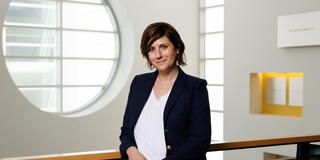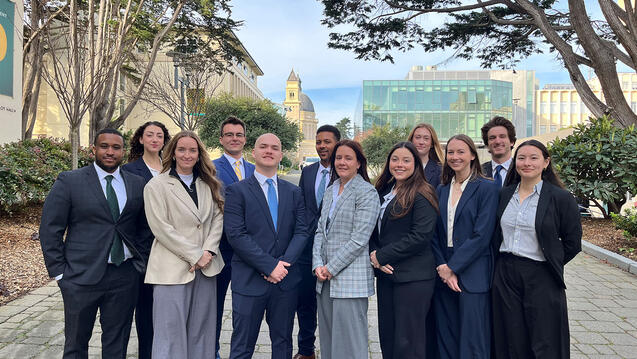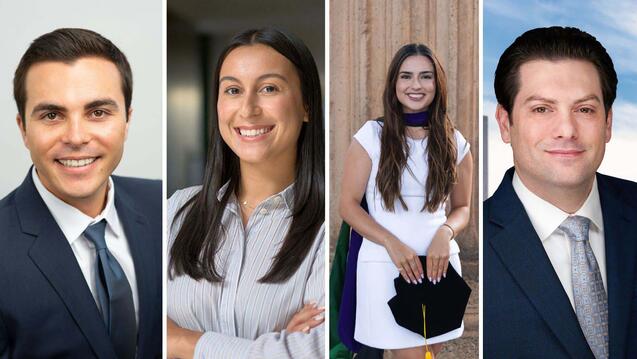Ready for the Next Wave

University of San Francisco School of Law Dean Johanna Kalb was not the child who declared that she wanted to be a lawyer at the age of 5, nor the college student who was taking the LSAT during senior year, determined to go straight to law school upon graduating. She wants USF’s School of Law students to know this. “There is no one path to law school,” she said. “Life’s curveballs are what makes it interesting.”
The new dean’s own resume reflects that conviction. A BA in German Studies from Stanford University. An MA in International Relations with a focus on African Studies from Johns Hopkins University. A JD from Yale Law School. “At various times in my life, I thought I’d be a doctor, maybe a research psychologist. Then I thought I might go into independent filmmaking in Berlin. Or work on advancing renewable energy in D.C.” She was entering that field when 9/11 happened. Enron collapsed later that same year. “It was a scary time in this country. Debates were raging about which and whose civil rights needed to be sacrificed to keep us safe. I wanted to be part of this conversation, and I knew that the best way to get people to take me seriously was to go to law school.”
She first began graduate studies at Johns Hopkins, where the international relations program would allow her to attend law school concurrently. As she attended classes, she also applied to law schools and was accepted at several, including her undergraduate alma mater, Stanford. She was packed and on her way when she received a call from the dean of admissions at Yale Law.
“It’s because of that phone call that I developed an understanding of how important it is to make personal connections with students,” Kalb said. It’s also because of that phone call that she reversed course, figuratively and literally, and became a Yale Law student. She spent the summer before law school working for an NGO in Uganda, preparing a constitutional challenge to the death penalty. “I left that experience with a deep respect for the ways in which the jurisprudence of rights protections was developing in post-colonial African countries, and I was interested in how that translated to our national constitutional discourse.”
In law school, Kalb first joined a clinic that took cases emerging out of the detentions at Guantanamo Bay, ultimately joining a team of students who worked with Professor Neal Katyal of Georgetown Law School on Hamdan v. Rumsfeld, a case in which the Supreme Court invalidated the military commissions. “I traveled to Guantanamo Bay two weeks before the bar exam to tell Mr. Hamdan he had prevailed in the Supreme Court,” she said. “It’s not a strategy that I recommend for bar takers, but it was certainly a formative moment in my life.” Her work on the military commission cases helped Kalb see parallels between these extraordinary cases and the ordinary rights abuses in other forms of American detention. She also joined clinics focused on prisoner rights litigation and on criminal defense and began to write about the parallels she saw across these contexts, namely, the ways that disfavored groups were excluded from accessing basic human and civil rights.
These varied experiences prepared Kalb well for her first clerkship, with a judge in Mississippi, a part of the country that was new to her. “It’s another example of following — not resisting — the twists and turns life takes,” she said. It was during that clerkship that she met her future husband, Reuben Teague, then a clerk for a judge in Louisiana. Her next clerkship was back in D.C., and then she needed to find a job in New Orleans. After Hurricane Katrina, Teague had co-founded a real estate development firm focused on bringing sustainable and green features to rebuilding homes for low- and middle-income city residents. A law professor friend encouraged her to think about a teaching position. She applied and was hired at Loyola University New Orleans College of Law (LOYNO).
“Again, it wasn’t my plan to go straight into teaching after clerking for two years. But that’s what happened — and I loved it.” Kalb taught constitutional law and international human rights and noticed how her students quickly zeroed in on human rights issues in the United States, Louisiana, and New Orleans. So she created a course called Human Rights Advocacy in the United States, in which students worked collaboratively with community partners to identify and advocate against local human rights abuses. She connected with other scholars and practitioners around the country who were thinking about how to enforce human rights law domestically, and eventually developed a casebook by that title.
After she received tenure at Loyola, life intervened again. Teague accepted a role in impact investments based in New Jersey, and Kalb took a leave of absence from Loyola. While on the East Coast, she worked as a fellow at the Brennan Center for Justice at the NYU School of Law, and as a visiting professor at Yale, directing the Arthur Liman Center for Public Interest Law.
“That’s where I realized I was good at administration — and that I liked it! It was just good luck to learn that about myself,” Kalb said. This realization carried her into a new role upon returning to Loyola: associate dean of administration and special initiatives. In this role, Kalb oversaw most of the nonacademic departments at the law school, helping to find efficiencies in operations, lifting up and supporting talented staff, and improving the law school’s marketing and communications.
After successfully helping lead LOYNO through the tumult of the COVID-19 pandemic, she was nominated for deanships and went on to lead the University of Idaho College of Law for three years. During her time in Idaho, she was recognized for helping recruit the largest and most diverse classes in the college’s history. She also led the college’s two most successful fundraising years and oversaw the creation of an extensive bar prep program that resulted in a 10 percent improvement in bar passage. Idaho’s Associate Dean of Faculty Aliza Cover believes Kalb “has a gift for understanding what people and institutions need to thrive, and she works tirelessly to achieve meaningful progress.”
When the USF Law deanship came up, she felt ready for a new challenge and threw her hat in the ring. Alumnus and longtime USF Law supporter Tom Onda ‘90 served on the Dean’s Search Committee. His first thoughts? “‘She’s the one!’ Honestly, that was my immediate thought after meeting Dean Kalb.” Why? Onda said, “She exemplifies Jesuit values — thoughtful, committed to doing the right thing, and invests time in building strong relationships. Beyond these impressive qualities, what stood out the most to me is that Dean Kalb is genuinely a good person. She actively listens to and considers different points of view, while also having the courage to make difficult decisions. I have every confidence that she will guide us toward a bright future.”
So what is Kalb’s vision for the future of USF Law? “First and foremost, I am inspired by the Jesuit commitment to educational access. Jesuit law schools have always been leaders in thinking about how to offer legal education to communities that have been historically excluded from the profession, and the diversity of USF’s alumni illustrates how successful these efforts have been,” Kalb says. She sees her role as ensuring that USF Law faculty are able to continue to do innovative work to overcome the barriers that prevent talented candidates from applying to and succeeding in law school and on the bar.
Kalb also wants to focus on making sure everyone knows that USF Law is thriving. “We have been through some challenging times in recent years,” she says, “but we have come back stronger under Dean Freiwald’s leadership.” Now, bar passage and employment rates are up, and the school has been nationally recognized for building strong advocacy skills and preparing students for practice. And Kalb wants to get the word out. Last, but certainly not least, Kalb has a big vision for expanding USF Law’s areas of excellence. “I want prospective students to understand that our Jesuit commitment to social justice is broad and inclusive. Students can change the world through excellent work as a public defender or an animal justice lawyer, but also as a tech lawyer, a securities lawyer, or a tax lawyer.“ USF Law students currently have the opportunity to do cutting-edge work in clinics focused on immigration, racial justice, human rights law, and intellectual property. Kalb’s goal is to expand the opportunities students have to engage with emerging technologies and corporate and transactional practice. “The lawyers in these areas have tremendous power to shape our society. We want our students to bring their values and their vision for a more just world into every discipline,” Kalb says.
It’s a tall order, but Kalb is up to the challenge. She met with every member of the faculty and senior staff before even arriving in San Francisco, and hit the ground running almost as soon as her plane touched down. She might never have imagined herself as living in San Francisco, but now that she’s here with Teague, their two children (Leo, 14, and Thea, 12), and their pit bull mix Ash, she’s excited to begin a new adventure and set down roots.
The family plans to take full advantage of their new location, with camping trips, concerts, museum trips, and festivals on the agenda. And now that she’s within a stone’s throw of an ocean, Kalb plans to finally learn to (literally) surf. She couldn’t be happier that her life’s latest wave rode her to the helm of USF Law. “I’m ready to be a part of the campus community, and I’m ready to get to work.”


